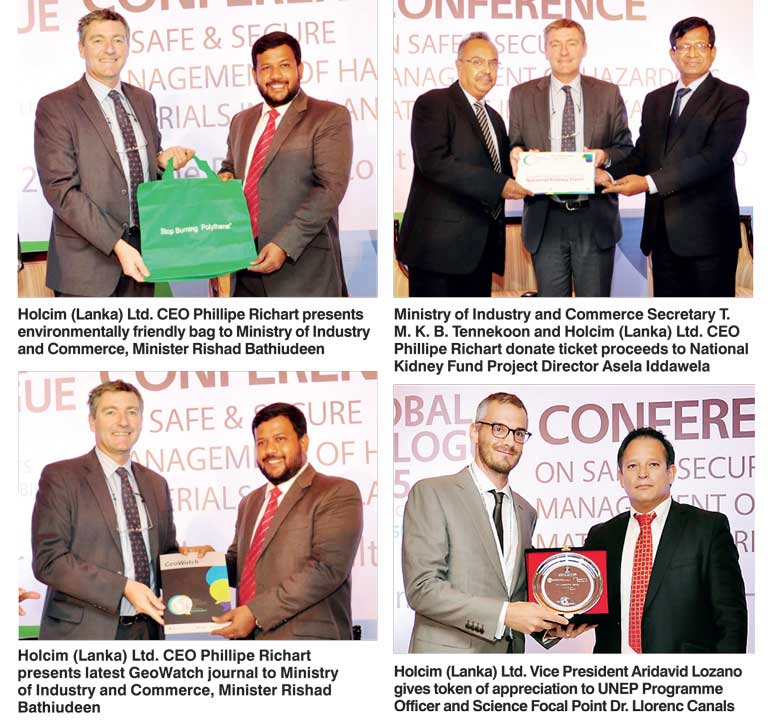Saturday Feb 21, 2026
Saturday Feb 21, 2026
Monday, 21 September 2015 00:00 - - {{hitsCtrl.values.hits}}

By Shiran Illanperuma
In a signed declaration read by Secretary Minister of Defence Karunasena Hettiarachchi at the International Conference on Safe and Secure Management of Hazardous Materials in Sri Lanka, President Maithripala Sirisena declared his commitment towards, “Making Sri Lanka a better place with sustainable development while eradicating misuse of hazardous materials.”
The President, who currently holds the environment portfolio, was unable to attend the event himself due to a scheduling conflict with the main commemoration ceremony of Anagarika Dharmapala’s 151st birth anniversary. However, speakers noted that the President’s intention to attend and his signed statement prove that he considers the issue a worthwhile enterprise.
Minister of Industry and Commerce Rishad Bathidueen, who was also in attendance, says that South Asia is the second largest global consumer of chemical agents after East Asia. Arguing that Sri Lanka falls within regional consumption patterns he says: “Due to our agricultural base and the use of industrial chemicals in the production of plastics, metals and rubber we have a high output of chemical waste.”

Bathiudeen states that it is time for the country to look into the responsible handling of industrial waste. He stressed the need for raising awareness and the Ministry of Industry and Commerce’s commitment to support events that encourage dialogue between stakeholders and policymakers. “I believe it is time to use new technologies for responsible waste disposal,” he said.
The last few years of development have seen an alarming rise of industrial accidents including high profile incidents such as the alleged water poisoning by a Jiffy factory and the more recent Kelani river oil spill by Coca Cola. Secretary, Ministry of Industry and Commerce T.M.K.B. Tennekoon says: “Most of these accidents happened due to a lack of awareness and negligence of safety and security.”
Government spending on medical issues related to accidental poisoning amounts to a substantial amount of money from the country’s GDP says Tennekoon. For the sake of human welfare and long-term financial security he says: “An effective public-private partnership is crucial to promote awareness and inform stakeholders what hazards are present and how they can be controlled and disposed of.”
Recognising that the issue of chemical waste management is an international issue and not a purely Sri Lankan one, the event was attended by local and foreign stakeholders from both the private and public sectors.
The conference was jointly organised by the Ministry of Industry and Commerce, Geocycle, which is the waste management arm of Holcim; and Netherlands-based Organisation for the Prohibition of Chemical Weapons. The Daily FT was the official print media partner.
Pix by Sameera Wijesinghe
Speakers at the International Conference on Safe & Secure Management of Hazardous Materials in Sri Lanka emphasised that steps needed to be taken not only to manage existing flows of waste but also to minimise future production.
Secretary to the Minister of Defence, Karunasena Hettiarachchi, proposed a policy that would require consumer goods manufacturers to print guidelines for disposal on the back of their products.
“Manufacturers today are required by law to state the contents of their product, similarly there should be a policy framework to require directions for disposal on products,” Hettiarachchi said. Without awareness over proper methods of waste disposal, consumers litter in ways that are environmentally damaging, he argued.
Furthermore, commenting on the source of hazardous waste, Hettiarachchi says: “We see a global pattern where the rich produce more waste, particularly in developed countries where, as the rate of consumption increases, so does the amount of waste.”
Therefore those responsible for waste should lead the charge to dispose of it sustainably, argues Hettiarachchi.
Meanwhile, CEO of Holcim (Lanka) Ltd. Phillipe Richart said that one of the key sustainability goals of Holcim’s operations in Sri Lank was to reduce the usage of raw materials, particularly water. “Our goal is to work towards water positive operations throughout the country,” he said.
Richart states that Holcim endeavours to rehabilitate used up quarries and have replanted 50,000 to 60,000 trees in their efforts. The company also works with local stakeholders to rescue and relocate animals displaced by industrial action.